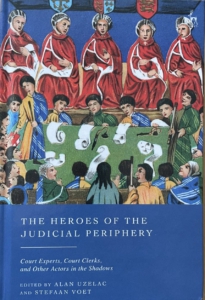Views
US Ninth Circuit rules in favor of Spain in a decades-long case concerning a painting looted by the Nazis
This interesting case comment has been kindly provided to the blog by Nicolás Zambrana-Tévar, LLM, PhD, KIMEP University
The United States Court of Appeals for the Ninth Circuit has found in favor of Spain as defendant in a property case spanning several decades. A panel of three judges has unanimously ruled that, applying California conflict of law rules, Spain has a stronger interest than the claimants in the application of its own domestic law, including its own rules on prescriptive acquisition of property and the statute of limitations, thus confirming the ownership of a stolen painting, now owned by a Spanish museum.
Colonialism and German PIL (2) – German and European Structures and Values
This post is part of a series regarding Colonialism and the general structure of (German) Private International Law, based on a presentation I gave in spring 2023. See the introduction
The Convergence of Judicial Rules between Mainland China and Hong Kong has Reached a Higher Level
By Du Tao* and Jingwei Qiu**
With the increasingly close personnel exchanges and deepening economic cooperation between Mainland China and Hong Kong, the number and types of legal disputes between the two regions have also increased. Against the backdrop of adhering to the “One Country, Two Systems” principle and the Basic Law of Hong Kong, the judicial and legal professions of the two regions have worked closely together and finally signed “the Arrangement on Reciprocal Recognition and Enforcement of Judgments in Civil and Commercial Matters by the Courts of the Mainland and of the Hong Kong Special Administrative Region (hereinafter referred to as “REJ Arrangement”) in January 2019, which will come into effect in January 2024. REJ Arrangement aims to establish an institutional arrangement for the courts of the Mainland and the Hong Kong Special Administrative Region to recognize and enforce judgments in civil and commercial cases, achieve the “circulation” of judgments in civil and commercial cases, reduce the burden of repeated litigation, and save judicial resources in the two regions.
News
Conference: “The Next 25 Years of Private International Law: What Does the World Need?”, 23 June 2025 in Groningen
The Ulrik Huber Institute for Private International Law is delighted to announce a special one-day conference entitled:
The Next 25 Years of Private International Law: What Does the World Need?
This conference marks a significant occasion: the celebration of Professor Mathijs ten Wolde’s 25-year tenure as a professor and director of the Ulrik Huber Institute. In honour of his contribution to the field and his mentorship of generations of legal scholars, the event will bring together former PhD students and distinguished colleagues from across the globe to reflect on the future direction of private international law.
Key Themes Include:
- The role of private international law in a changing world;
- Evolving cross-border legal frameworks (e.g. EU Regulations and HccH Conventions);
- Regional vs. global harmonisation efforts;
- The impact of digitalisation;
- New frontiers in family, commercial, IP, transport and procedural law.
We warmly invite all scholars, practitioners and students with an interest in private international law to join us for this day of dialogue and celebration. More information, including the conference programme, is available via the following link: https://www.rug.nl/rechten/agenda/2025/the-next-25-years
New Book and Seminar Heroes of the Judicial Periphery
 Last month the book The Heroes of the Judicial Periphery: Court Experts, Court Clerks, and Other Actors in the Shadows, edited by Alan Uzelac and Stefaan Voet (Hart/Bloomsbury Publising, 2025) was published. The book highlights the role of perhaps less prominent, but nevertheless important actors in (international) judicial procedures from a national, comparative and/or international perspective.
Last month the book The Heroes of the Judicial Periphery: Court Experts, Court Clerks, and Other Actors in the Shadows, edited by Alan Uzelac and Stefaan Voet (Hart/Bloomsbury Publising, 2025) was published. The book highlights the role of perhaps less prominent, but nevertheless important actors in (international) judicial procedures from a national, comparative and/or international perspective.
The European Civil Justice Centre (Erasmus School of Law) hosts a seminar in collaboration with the editors to launch the book on 4th July 2025 from 10-12 CEST.
Discussions on civil justice mostly focus on procedural rules, and the role of courts, parties and lawyers. This book addresses other actors that are often overlooked in academic and policy debates. It assesses the role of court experts, court clerks and court staff, and other actors on the ‘judicial periphery’ who play an important role and often co-determine the pace, outcome, and tone of the judicial process.
The knowledge and skills of experts may be indispensable at times, but it is among the most expensive, complicated and time-consuming means of evidence. The judges adjudicate, but where experts are involved in the process, they have a decisive impact on the outcome of litigation. Therefore, a principal focus of the book is on experts and how they are appointed, managed, and remunerated across Europe and the world.
The editors will discuss topical issues highlighting these ‘actors in the shadows’ and key experts will present their ideas based on the key findings of the book chapters, followed by discussion.
Registration for free here (hosted through Eventbrite)
Speakers & program:
10.00 Opening and welcome: Xandra Kramer
10.05 Alan Uzelac & Stefaan Voet – Heroes of the Judicial Periphery
10.15 Juraj Brozovic – The Case of Judicial Advisors in Croatia
10.30 Camilla Bernt – Expert Evidence in Custody Disputes and Child Protection Cases
10.50 Discussion
11.05 Michael Stürner – Experts on Foreign Law in German Civil Procedure
11.30 Adriani Dori & Xandra Kramer – The Role of Third-Party Funders in the Shadow of the Procedure
11.45 Discussion
Book on The New Relationship between the United Kingdom and the European Union
A book on The New Relationship between the United Kingdom and the European Union was recently published. The book is edited by Dr. Emmanuel Guinchard (Liverpool John Moores University) and Prof. Carlo Panara (University of Leicester) and may be accessed here.
Overview
- Covers the whole spectrum of the new relationship between the UK and the EU
- Contains original discussion and evaluations of the impact of Brexit on UK sovereignty
- Includes both topics covered in the recent agreements and topics that have been left in a grey area



